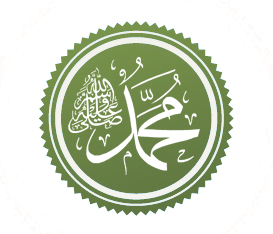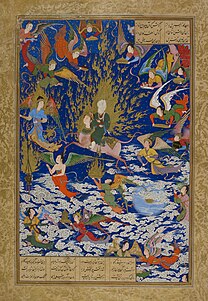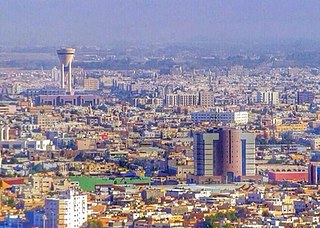The Five Pillars of Islam are some basic acts in Islam, considered mandatory by believers, and are the foundation of Muslim life. They are summarized in the famous hadith of Gabriel. The Sunni and Shia agree on the essential details for the performance and practice of these acts, but the Shia do not refer to them by the same name. They make up Muslim life, prayer, concern for the needy, self-purification, and the pilgrimage, if one is able.

Tuanku Imam Bonjol, also known as Muhammad Syahab, Peto Syarif, and Malim Basa, was one of the most popular leaders of the Padri movement in Central Sumatra. He was declared a National Hero of Indonesia.
Riḥla refers to both a journey and the written account of that journey, or travelogue. Associated with the medieval Islamic notion of "travel in search of knowledge", the riḥla as a genre of medieval and early-modern Arabic literature usually describes a journey taken with the intent of performing the Hajj, but can include an itinerary that vastly exceeds that original route. The classical riḥla in medieval Arabic travel literature, like those written by Ibn Battuta and Ibn Jubayr, includes a description of the "personalities, places, governments, customs, and curiosities" experienced by traveler, and usually within the boundaries of the Muslim world. However, the term rihla can be applied to other Arabic travel narratives describing journeys taken for reasons other than pilgrimage; for instance the 19th century riḥlas of Muhammad as-Saffar and Rifa'a al-Tahtawi both follow conventions of the riḥla genre by recording not only the journey to France from Morocco and Egypt, respectively, but also their experiences and observations.

Bakkah, according to Muslim scholars, is an ancient name for Mecca, the most holy city of Islam. Most people believe they are synonyms, but to Muslim scholars there is a distinction: Bakkah refers to the Kaaba and the sacred site immediately surrounding it, while Mecca is the name of the city in which they are both located.

Banū Hāshim is the clan of the Quraysh tribe, to which the Islamic prophet Muhammad belonged; his great-grandfather was Hashim ibn Abd Manaf, for whom the clan is named. Members of this clan are referred to as Hashemites. Descendants of Muhammed usually carry the titles Sayyid, Syed, Hashmi, Sayed and Sharif, or the Ashraf clan.

The Hegira is the migration or journey of the Islamic prophet Muhammad and his followers from Mecca to Yathrib, later renamed by him to Medina, in the year 622. In June 622, after being warned of a plot to assassinate him, Muhammad secretly left his home in Mecca to emigrate to Yathrib, 320 km (200 mi) north of Mecca, along with his companion Abu Bakr. Yathrib was soon renamed Madīnat an-Nabī, but an-Nabī was soon dropped, so its name is "Medina", meaning "the city".

The Isra and Mi'raj are the two parts of a Night Journey that, according to Islam, the Islamic prophet Muhammad took during a single night around the year 621. Within Islam it signifies both a physical and spiritual journey. The Quran surah al-Isra contains an outline account, while greater detail is found in the hadith collections of the reports, teachings, deeds and sayings of Muhammad. In the accounts of the Isra’, Muhammad is said to have traveled on the back of a winged mule-like white beast, called Buraq, to "the farthest mosque". By tradition this mosque, which came to represent the physical world, was identified as the Al-Aqsa Mosque in Jerusalem. At the mosque, Muhammad is said to have led the other prophets in prayer. His subsequent ascent into the heavens came to be known as the Mi‘raj. Muhammad's journey and ascent is marked as one of the most celebrated dates in the Islamic calendar.

Bakka-Phoenix Science Fiction & Fantasy Bookstore is an independent bookstore in Toronto, Ontario, which specializes in science fiction and fantasy literature.

Bakka is a tiny village in the municipality of Aurland in Sogn og Fjordane county, Norway. It is located on the western shore of the Nærøyfjord, about 5 kilometres (3.1 mi) north of the village of Gudvangen and access to the European route E16 highway. The village is home to the Bakka Church. In 2000, the 1.7-kilometre (1.1 mi) Bakka Tunnel was constructed on the road from Gudvangen to Bakka to make the journey quicker and safer.

Islam is one of the major religions practiced widely in Ghana. Its presence in Ghana dates back to the 10th century. The population of Muslims in Ghana is about 35.6%.

Dhul-Qarnayn,, , appears in Quran 18:83-101 as one who travels to east and west and erects a wall between mankind and Gog and Magog. Elsewhere the Quran tells how the end of the world would be signaled by the release of Gog and Magog from behind the wall, and their destruction by God in a single night would usher in the Day of Resurrection. The story has its origins in legends of Alexander the Great.

Dhikr are devotional acts, primarily in Sufi Islam, in which short phrases or prayers are repeatedly recited silently within the mind or aloud. It can be counted on a set of prayer beads or through fingers of the hand. A person who recites the Dhikr is called a ḏākir . Tasbih (تسبيح) is a form of dhikr that involves the repetitive utterances of short sentences glorifying God. The content of the prayers includes the names of God, or a duʿāʾ taken from the hadith or the Quran.
The "mut'ah of Hajj" is the relaxation of the ihram between the Umrah and Hajj, including its dress code and various prohibitions.

Mohammad Baqer Majlesi (1627–1699), known as Allamah Majlesi or Majlesi Al-Thani, was a renowned and very powerful Iranian Twelver Shi'a cleric, during the Safavid era. He has been described as "one of the most powerful and influential Shi'a ulema of all time", whose "policies and actions reoriented Twelver Shia'ism in the direction that it was to develop from his day on."
Peter JacksonFBA is a scholar and historian, specializing in the Crusades, particularly the contacts between the Europeans and the Mongols as well as medieval Muslim India. He is Emeritus Professor of Medieval History at Keele University and editor of The Cambridge History of Iran: The Timurid and Safavid Periods.
Abu al-Hassan Muhammad ibn Yusuf al-Amiri was a Muslim theologian and philosopher of Persian origin, who attempted to reconcile philosophy with religion, and Sufism with conventional Islam. While al-'Amiri believed the revealed truths of Islam were superior to the logical conclusions of philosophy, he argued that the two did not contradict each other. Al-'Amiri consistently sought to find areas of agreement and synthesis between disparate Islamic sects. However, he believed Islam to be morally superior to other religions, notably Zoroastrianism and Manicheism.

The Long Journey Home was a ceremonial event held at the main campus of the University of Washington on May 18, 2008, commemorating the Japanese American students who, due to the passage of Executive Order 9066 in 1942, were forced to leave the school and live in internment camps in the western United States. For nearly seventy years, many Japanese Americans were unable to return to the university to complete their education. Some attended at other universities, while others were forced to end their college career early because of financial reasons. In order to recognize the Japanese American students affected by the government's decision, the University of Washington carried out a ceremony "to honor the students and to educate current and future generations about the grievous national tragedy" by incorporating guest speakers and video memoirs while the students honored at the day's ceremony were given honorary degrees from the University of Washington.

The Hajj is an annual Islamic pilgrimage to Mecca, Saudi Arabia, the holiest city for Muslims, and a mandatory religious duty for Muslims that must be carried out at least once in their lifetime by all adult Muslims who are physically and financially capable of undertaking the journey, and can support their family during their absence.
Mdoukha is a village and municipality situated 72 kilometres (45 mi) east of Beirut in the Rashaya District, Beqaa Governorate, Lebanon. The village's population is Sunni. A significant majority of the population are also Lebanese Canadians, of which 60% live in London, Ontario.

Liwa Dawud was an armed group in the Syrian Civil War headquartered in Samrin in the Idlib Governorate and originated as a subunit in Suqour al-Sham then later became an independent faction then joined the Jaysh al-Sham coalition until 2014 when the group along with its leader defected to the Islamic State of Iraq and the Levant during the course of the Inter-rebel conflict during the Syrian Civil War.















